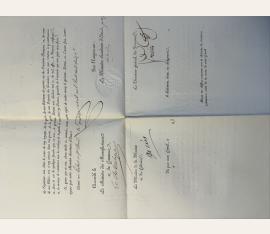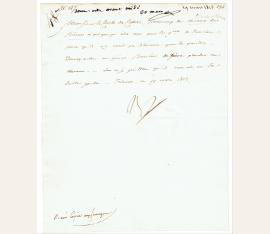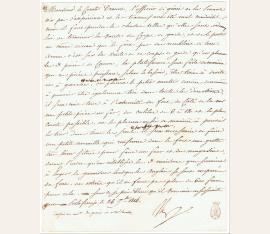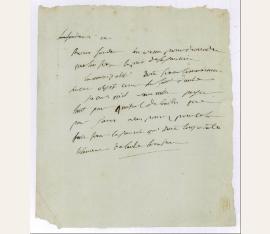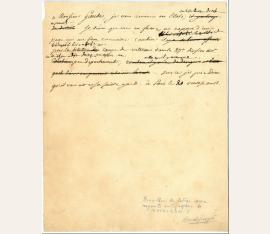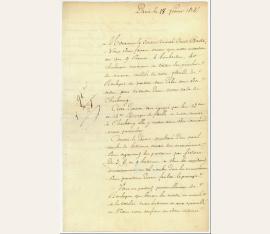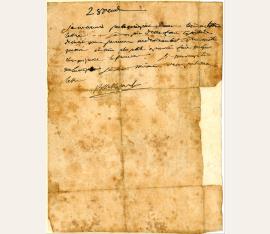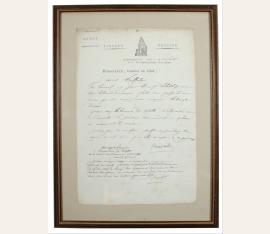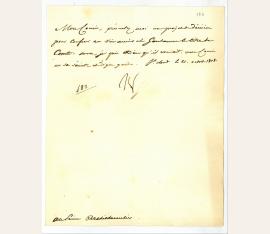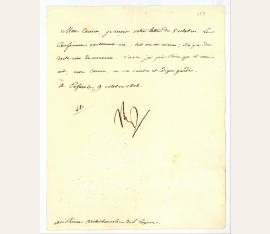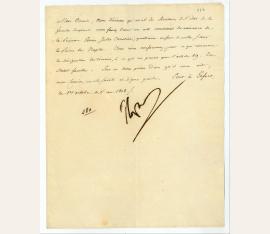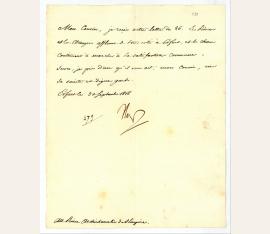Emperor of the French (1769-1821). Document signed „NP“. Palais de Saint-Cloud. Quer-Folio. 2 pp. Partly printed with an imperial arms vignette and a blind stamp (small slit at the intersection of the 4 folds).
$ 5,340 / 5.000 €
(93459)
Maritime passport granted to a ship of the trading house "Decaze fils-ainé & Cie de Bordeaux," departing from the port of Bordeaux, "to be introduced into one of the ports of France, at its choice, with cotton, fish oils, dye woods, salted fish, and cod; coffees and sugars from French, American, and Asian colonies; cocoas, groceries of all kinds from former Dutch islands; indigos, mahogany, and cabinet woods.“ Countersigned by the Minister of Manufactures and Commerce: Jean-Baptiste Henry Collin, Count of Sussy; Minister Secretary of State: Duke of Cadore; Minister of the Navy and Colonies: Duke Decrès, and the Director General of Customs François Ferrier.
Emperor of the French (1769-1821). Signed document „Np.“. Trianon. 4to. 1/2 p.
$ 4,806 / 4.500 €
(93569)
„Monsieur le comte de Cessac, beaucoup de chevaux de Brême n'ont pas pu être reçus pour les neuvièmes de lancier parce qu'il n'y avait pas d'hommes pour les prendre donner ordre de général boursier de faire prendre ses chevaux sur ce prix Dieu qu'il vous ait en sa sainte garde Trianon le 19 mars 1813“. Translation: „Monsieur le Comte de Cessac, many horses from Bremen could not be received for the Ninth Lancers because there were no men available to take them. Give General Boursier orders to have these horses taken. May God keep you in His holy care. Trianon, March 19, 1813.“
Emperor of the French (1769-1821). Brief mit eigenh. Unterschrift „Nap“. Portoferrajo (Elba). 4to. 1 p.
$ 6,941 / 6.500 €
(93570)
To the Count Drouot from the nine months lasting period in exile in Elba with two handwritten annotations. "Monsieur le Comte Drouot, l'officier du génie de la Pianose n'a pas d'expérience, et les travaux ont été mal conduits. Mais il faut prendre les choses telles qu'elles sont. Ordonnez-lui de terminer la vante du Corps de garde et de le porter au même niveau que le fort pour des remblais de terre. Comme c'est sur la vante de ce corps de garde qu'on placera les 3 pièces de canon, la plateforme sera faite de manière que ces pièces puissent, selon le besoin, être tirées à droite et à gauche, en avant et en arrière.
On placera le petit mortier derrière de manière à pouvoir également être tiré dans toutes les directions. Il sera mis tout à l'extrémité du fort. Du côté de la mer, une petite pièce en fer du calibre de 6 à 12 et la plus courte possible sera placée. On la disposera aussi de manière à pouvoir la tirer dans tous les sens et sur [...]. Il sera nécessaire de construire une petite muraille qui renferme dans le fort une grotte très bien située pour faire un four et des magasins. Donnez l'ordre de rétablir les 3 maisons qui servaient à loger la garnison lorsque les Anglais se sont emparés du fort. On estime qu'il ne faut pas plus de 600 francs pour cela. = Sur ce, je prie Dieu qu'Il vous ait en Sa sainte garde." Translation: "Count Drouot, the engineering officer from Pianosa, lacks experience, and the works have been poorly conducted. However, one must accept things as they are. Instruct him to finish the vante of the guardhouse and to bring it to the same level as the fort with embankments of earth. As it is on the vante of this guardhouse that the 3 cannon pieces will be placed, the platform will be made so that these pieces can, as needed, be fired to the right and left, forward and backward. Place the small mortar behind in a way that it can also be fired in all directions. It will be positioned at the very end of the fort. On the sea side, a small iron piece, caliber 6 to 12, and as short as possible will be placed. It will also be arranged to be fired in all directions and on [...]. It will be necessary to build a small wall that encloses in the fort a cave very well situated to make an oven and stores. Give the order to restore the 3 houses that were used to lodge the garrison when the English took possession of the fort. It is estimated that no more than 600 francs are needed for this. = On this note, I pray to God that He watches over you.".
Emperor of the French (1769-1821). Autograph letter (fragment). N. p. 4to. ¾ p.
$ 37,377 / 35.000 €
(48307/BN30731)
Final page of the broullion of a letter to an unidentified recipient, possibly to M. Perrier, director of the arsenal of Marseille, or Sucy, commissaire des guerres. The letter, which contained extensive instructions on the deployment of artillery, was obviously written at the end of 1793 or in early 1794, immediately after the Fall of Toulon, when the Republicans won an early victory over a Royalist rebellion and Napoleon was "inspecteur des côtes". The fragment preserved here begins with the words "Le fondeur est", which are struck out, then continues: "Roux, fondeur, ést venu me demander que l'on fixe le prix de sa journée.
La municipalité doit fixer le maximum sur cet objet, comme sur tant d'autres. Je crois qu'il vaut mieux payer tant par quintal de balles que par jours. Vous pouvez, pour cela, faire fixer la journée qui doit toujours être l'élément de toutes les mesures". - Lower left corner torn off (not touching text); some brownstaining, otherwise a perfect sheet. Once in the collection of André de Coppet (1892-1953), now stored at the Firestone Library, Princeton..
premier empereur des Français (1769-1821). Draft for a letter with several autograph corrections. Paris. ½ p. in-4.
$ 10,679 / 10.000 €
(59652/BN43371)
Rare draft for a letter to his Minister of Finances, Charles Gaudin (1756-1841), asking for more information about aid to the veterans of Piedmont as they would soon be his subjects in the newly created Kingdom of Italy: "Monsieur Gaudin, je vous renvoie vos états sur les biens des camps de vétérans en Piémont. Je désire que vous me fassiez un rapport d'une page, qui me fasse connaitre 'la loi a affecté' la quotité des biens que la loi a affectés aux camps de vétérans dans la 27è division militaire, combien il y en a déjà de désignées pour ce service et ce qu'il y manque" [Mister Gaudin, I return your budget of the assets of the veterans' camps in Piedmont to you.
I want you to compile a one page report for me that informs me 'the law has affected' the share of the assets that the law has affected in the veterans' camps of the 27th military division, how many have already been appointed for this service and what it lacks"]. - Because of the many corrections the letter was never signed or sent. Every line has been partly crossed out or modified by the Emperor. - Napoleon's coronation as Emperor of the French had only taken place three months prior at which occasion the deputies of the Italian Republic officially offered the crown of Italy to him. On March 17, 1805 the political transformation of the Italian Republic to the Kingdom of Italy (1805-1814) was put into effect. The letter to Charles Gaudin relates to this process as Napoleon wanted to be fully informed about the financial obligations to the veterans of Piedmont, his new subjects..
Emperor of the French (1769-1821). Letter signed ("Napoleon"). Paris. 18.02.1812. Folio. 2 pp.
$ 3,738 / 3.500 €
(72678/BN46586)
A letter to Rear Admiral Count Batte instructing him how to move a part of the flotilla from Boulogne-sur-Mer to Cherbourg. - Napoléon informs Count Batte about his intention to move 9 prams, 4 bombers and 40 canon shallops of the new type without delay from Boulogne to Cherbourg. The division will be equipped with the 12th and 14th garrison of the flotilla and on its arrival at Cherbourg it will remain without any special commander. As the simultaneous departure of such a number of ships would cause inconveniences, Napoléons asks Count Batte to organize the departure in sections of 3, 6 or 9 ships and to send off such a number one after the other as the circumstances will allow him to.
Napoléon is convinced that he has to facilitate the passage. He asks Count Batte not to leave Boulogne until at least half of the totality of the ships will have appeared and his activities will be confirmed to him. Napoléon tells Count Batte to make sure not to miss any occasion to increase the departure of sections of the flotilla taking into consideration that the season is still very favourable for this movement and that any delay could cause an infinite retardation of success. Napoléon informs Count Batte that upon his arrival at Cherbourg the Ministry of the Navy will address him with instructions concerning the task that he has to fulfill and concerning the ultimate destination of this important part of the flotilla. Napoléon ends his letter by pleading to god to keep Rear Admiral Count Batte in good health. - Some tiny holes (not touching the signature)..
Emperor of the French (1769-1821). Autograph manuscript (6½ lines). Saint Helena. 102 x 103 mm. Mounted on a single page (8vo) together with a contemporary handwritten transcription.
$ 26,698 / 25.000 €
(72803/BN46860)
Notes on the Battle of Voltri (1796): "Rampon et la Harpe [-] par le Gal en chef lui meme la deroute fut complette tout le corps d'Argenteau fut ecrase dans le tem[p]s queu Beaulieu descendait a Voltri ou il ne trouvait plus personne" (transl.: "Rampon and la Harpe - by the commanding General himself - defeat was complete - all of d'Argenteau's corps was erased while Beaulieu descended to Voltri, where he found nobody left"). - With a certification of authenticity at the bottom: "corrections de la campagne d'Italie écrit par Napoleon à Briars, isle Ste helene en 1815 / Cte.
de Las Cases". Emmanuel, comte de Las Cases and his son accompanied the former emperor to Saint Helena. There, he acted informally but very assiduously as his secretary, taking down numerous notes of his conversations which thereafter took form in the famous "Mémorial de Sainte-Hélène"..
Emperor of the French (1769-1821). Autograph letter signed. No place. Small 4to. 1/3 page. With address.
$ 26,698 / 25.000 €
(72804/BN46861)
In this note Napoléon refers to another letter he wrote previously, urging the recipient to pursue matters in his sense and presenting himself as the most suitable person to promote things: "Je ne avais parlé qu'après donner dictat [?] à cette lettre et je vous prie d'elle faire la petition d'écrire que personne n'est destiné autant [...] que moi et non plus noté à pouvoir faire quelque chose que puisse le poursuivre. Si mes occupations me laisse[nt] [...] je ferais moimême avec urgence sa lettre.
| Bonaparte". (Translation: "I only spoke after having dictated [?] the letter, and I request you to make a petition of it, writing that nobody is so destined or more respected than I am to do something that could advance it. If my occupations permit me I will treat your letter urgently myself. Bonaparte". - Addressee illegible. Extensive spotting with slight damage to folds, reinforced in parts..
Emperor of the French (1769-1821). Document signed ("Bonaparte"). Cairo. Small folio (227 x 345 mm). 1 page. On headed stationery. Framed and glazed (320 x 441 mm).
$ 8,009 / 7.500 €
(89976/BN59418)
A scribal order to establish boards of trade in several Egyptian cities. Napoleon writes to his general in Cairo, requesting the names of such persons suitable to staff the Cairo board, mentioning that the board members for Rosette, Alexandria and Damiette will be named by the generals in charge there, and concluding with a request for three copies of the order, intended for the other generals: "Vous trouverez cy joint l'ordre p. l'établissement d'un tribunal de commerce. Faites moi passer les noms de ceux qui vous croyez devoir composer le tribunal de caire.
Quant aux tribunaux de rosette, d'alexandrie et de damiette, les généraux commandant en place en nommeront les membres. Je vous prie de me faire passer aujourd'huy trois copies de cet ordre pour être envoyée à ces generaux [...]". - With a handwritten postscript, presumably by the recipient, passing on the order to his colleagues in Alexandria, Rosette and Damiette (dated Cairo, "27 fructidor an 6" [13 September 1798]). - Very slightly brownstained in places; upper margin somewhat dust-toned. A fine document of Napoleon's efforts to set up French colonial administration in Egypt..
Emperor of the French (1769-1821). Letter signed "Np". Saint-Cloud. 4to. 4 lines.
$ 3,738 / 3.500 €
(92167/BN61163)
To the Archchancellor Jean-Jacques-Régis de Cambacérès, asking him to draft a decree for the ennoblement of vice-admiral Honoré Joseph Antoine Ganteaume: "présentez-moi un projet de décision pour conférer au Vice-amiral Ganteaume le titre de Comte". - Excepting the signature, the letter is in the hand of Napoleon's private secretary Claude-François Méneval. Traces of folds and very slight browning. Old accession number 482 in ink.
Emperor of the French (1769-1821). Letter signed "Nap". Erfurt. 4to. ½ p.
$ 3,738 / 3.500 €
(92168/BN61164)
To the Archchancellor Jean-Jacques-Régis de Cambacérès, reporting that the Congress of Erfurt was continuing as planned but there were no new developments: "Les Conférences continuent ici; tout va au mieux; il n'y a du reste rien de nouveau. Sur ce je prie Dieu qu'il vous ait, mon Cousin, en sa sainte et digne garde". - The meeting between Napoleon and Alexander I of Russia, known as Congress of Erfurt, lasted from 27 September to 14 October in the then-French city and was supposed to reaffirm the French-Russian alliance that had been forged by the Treaties of Tilsit in July 1807.
Napoleon was eager to impress his imperial guest and spared no expenses, hosting lavish receptions, hunting parties, and theatre performances. On the occasion of the Congress, Napoleon received Goethe on 2 October 1808, and Niccolò Paganini performed for the two emperors. - In the hand of Napoleon's private secretary Claude-François Méneval. Traces of folds and very slight browning. Old accession number 481 in ink..
Emperor of the French (1769-1821). Letter signed "Napo". Erfurt. 4to. ½ p. on bifolium.
$ 3,738 / 3.500 €
(92169/BN61165)
To the Archchancellor Jean-Jacques-Régis de Cambacérès, asking him to draft a birth certificate for his niece Louise Julie Caroline, the youngest daughter of Joachim Murat, King of Naples, and Napoleon's youngest sister Caroline in accordance with the statute of the imperial family: "Nous désirons qu'assisté du Secrétaire de l'État de la famille Impériale vous fassiez dresser un acte constatant la naissance de la Princesse Louise Julie Caroline, quatrième enfant de notre Soeur la Reine de Naples.
Vous vous conformerez, pour ce qui concerne la désignation des témoins, à ce qui est prescrit par l'article 19". - Louise Julie Caroline (1805-89) was born before the decree of the statute of the Imperial family on 30 March 1806, which explains the necessity for a new birth certificate and the delay. - The letter was written during the Congress of Erfurt, a meeting between Napoleon and Alexander I of Russia that lasted from 27 September to 14 October in the then-French city and was supposed to reaffirm the French-Russian alliance that had been forged in the Treaties of Tilsit in July 1807. Napoleon was eager to impress his imperial guest and spared no expenses, hosting lavish receptions, hunting parties, and theatre performances. On the occasion of the Congress, Napoleon received Goethe on 2 October 1808, and Niccolò Paganini performed for the two emperors. - In the hand of Napoleon's private secretary Claude-François Méneval. Traces of folds and very slight browning. Old accession number 480 in ink..
Emperor of the French (1769-1821). Letter signed "Nap". Erfurt. 4to. ½ p.
$ 3,738 / 3.500 €
(92170/BN61166)
To the Archchancellor Jean-Jacques-Régis de Cambacérès, reporting on the first days of the Congress of Erfurt, which attracted numerous "princes and foreigners" to the city and "continued to proceed to common satisfaction": "Les Princes et les étrangers affluent de tous côtés à Erfurt, et les choses continuent à marcher à la satisfaction commune". - The meeting between Napoleon and Alexander I of Russia known as Congress of Erfurt lasted from 27 September to 14 October in the then-French city and was supposed to reaffirm the French-Russian alliance that had been forged in the Treaties of Tilsit in July 1807.
Napoleon was eager to impress his imperial guest and spared no expenses, hosting lavish receptions, hunting parties, and theatre performances. On the occasion of the Congress, Napoleon received Goethe on 2 October 1808, and Niccolò Paganini performed for the two emperors. - In the hand of Napoleon's private secretary Claude-François Méneval. Traces of folds and very slight browning. Old accession number 479 in ink..
已出售
Autograph executive order, signed twice ("Bonaparte").
Autograph ist nicht mehr verfügbar
Eigenhändiges Manuskript ohne Unterschrift (Entwurf mit Durchstreichungen und Korrekturen)
Autograph ist nicht mehr verfügbar
A letter (draft) by Napoléon Bonaparte to a general about a project for the defence of Marseille, after the Siege of Toulon: „Je te prie de m’envoyer letat de lartillerie de place ou de lartillerie de siège. Je te previens général que j’ai donné ordre à 25 hommes de la compagnie Jourdan de rester à Marseille jusqu’à nouvel ordre ainsi qu’à un détachement de la compagnie d’ouvriers. Indépendamment de l’artillerie qui pourrait se trouver attaché aux différents bataillons il y a encore ici une compagnie de canonniers des mille de Paris.“ He also demands „letat somaire des bataillons qui composent la garnison avec un etat de situation de leurs provisions en cartouches et de letat de leur armement. Fais dire à l’un des canonniers qui pourraient être attaché aux bataillons volontaires de porter leur controle nominatif chez le citoyen Bernard capitaine d’artillerie commandant lartillerie de la place sous 24 heures. Tu sais combien il est urgent que l’on met en ordre dans lequipage de campagne. Si tu voulais faire marcher une pièce de 4 dans ce moment ci il serait impossible de t’obéir [..]“ (Translation: „Please tell me about the state of the field artillery or the siege artillery. I inform you that I have instructed 25 men from Jourdan company to remain in Marseilles until further notice, as well as a replacement of the worker troups. Aside from the artillery that could be attached to the various battalions, there is still a company of gunners from Paris here [...]“ Napoleon further asks for a a summary report on the battalions and a status report on their arming. Napoleon was appointed commander of the artillery in 1793 during the siege of the city of Toulon, held by insurgent moderate revolutionaries and royalists. The insurgents were supported by the British fleet. Eliminating this potential bridgehead for the British Army was therefore of great importance. For Napoleon, the success of Toulon was an important step in his coming ascent. He was promoted to Général de brigade on December 22nd, and when his wound was healed in early 1794, he was appointed commander of the Armée d'Italie set up in Nice. After the fall of the Jacobin rule, Napoleon was temporarily imprisoned as a partisan of Robespierre, but was soon released again. His military career suffered a setback due to the political change and led to the loss of his command.
Gedruckter Tagesbefehl an die Grande Armée von État nach der Schlacht von Austerlitz.
Autograph ist nicht mehr verfügbar
A printed Order of the Day to the Grande Armée d’État. by Général Napoléon. As a date we read 17 Frimaire an 14 (the third month of the French Republican calendar (1793–1805), originally running from 21 November to 20 December) or in our calender December 12, 1805. The important letter regulates the claims of the families of fallen soldiers, officers and generals, as well as the treatment of the children of the dead. „ORDRE DU JOUR. NAPOÉON Empereur des Français, Roi d'Italie, avons décrété et décretons ce qui suit: Article I. Les veuves des Généraux morts a la batiaille d'Austerlitz jouiront d'une pension de six mille francs leur vie durant; les veuves des Colonels et des Majors, d'une pension de deux mille quatre cents francs; les veuves dès Lieutenants et Sous-lieutenants, d'une pension de huit cents francs; Les veuves dès Soldats, d'une pension de deux cents francs.[...] Article I. Nous adoptons tous les entans des Généfaux, officiers et Soldats francais morts à la bataille d'Austerlitz. Article II. Ils scront tous entretenus et élevés à nos frais, les garcons dans notre palais impérial de Rambouillet et les filles dans notre palais impérial de St Germain. Aricle III. Independamment de leurs noms de bapeme et de famille, ils auront le droit d'y joindre celui de Napoléon. (Translation: „NAPOÉON Emperor of the French, has decided and ordered: Article 1. The widows of generals who died in the Battle of Austerlitz will receive a pension of six thousand francs for life; the widows of colonels and majores receive a pension of two thousand four hundred francs; the widows of lieutenants and sub-lieutenants receive a pension of eight hundred francs. [...] We adopt all the children of the generals, officers and French soldiers who died in the Battle of Austerlitz. Article II. They are all looked after and brought up at our expense, the boys in our Imperial Palace in Rambouillet and the girls in our Imperial Palace in St. Germain. Article III. Regardless of their baptismal and family name, they have the right to take Napoleon's name.“ The Battle of Austerlitz, also known as the Battle of the Three Emperors, took place on Monday, December 2nd, 1805, exactly one year after Napoleon I was coronated as Emperor in Paris. It is one of the most famous battles of the Napoleonic Wars. On the Pratzeberg between Brno (Brno) and Austerlitz (Slavkov u Brna) in Moravia, Emperor Napoleon I of France defeated an alliance of Austrian and Russian troops. The Austrians reported the loss as 4,000 dead, the Russians their own as 11,000. The French came to 1,290 dead and 6,943 wounded and made over 12,000 prisoners of war.
Brief mit eigenh. Unterschrift „Bonaparte“.
Autograph ist nicht mehr verfügbar
Brief mit eigenh. Unterschrift „Np“.
Autograph ist nicht mehr verfügbar
Brief mit eigenh. Unterschrift „Np“.
Autograph ist nicht mehr verfügbar
Brief mit eigenh. Unterschrift „Nap“.
Autograph ist nicht mehr verfügbar
Brief mit eigenh. Unterschrift „Nap“.
Autograph ist nicht mehr verfügbar
Brief mit eigenh. Unterschrift „Nap“.
Autograph ist nicht mehr verfügbar
To his Minister of War general Henri-Jacques-Guillaume Clarke, concerning the formation of the gunboats: “Monsieur le Duc de Feltre, donnez ordre au general Silly et au Général Rousseau pour que les chaloupes canonières soient constamment en mouvement, qu’elles tiennent perpétuellement la ligne d’embossage et ne restent jamais dans le port qu’elles fassent des patrouilles autour de l’ile. J’apprends que les ennemis viennent souder jusque sous la batterie du Nole, cela est honteux. [...]” (translation: “ [...] Tell General Silly and General Rousseau that the gunboats shall constantly move, constantly hold the line and never stay in the harbor and patrol the island [...]”).
Brief mit eigenh. Unterschrift „Np“.
Autograph ist nicht mehr verfügbar
Brief mit eigenh. Unterschrift „Np“.
Autograph ist nicht mehr verfügbar
To his Minister of War general Henri-Jacques-Guillaume Clarke, concerning a troop movement to Catalonia: “[…] let General Baraguey d'Hilliers know that he must inform the Plauzonne Division to come to Catalonia to help him […]”.
Letter signed "Nap".
Autograph ist nicht mehr verfügbar
